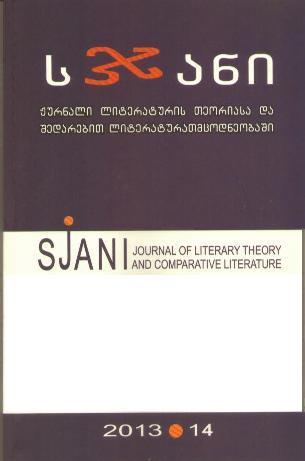ბესარიონ გაბაშვილის ვერსიფიკაციული სისტემა
Besarion Gabashvili’s Versification System
Author(s): Tamar BarbakadzeSubject(s): Literary Texts
Published by: ლიტერატურის ინსტიტუტის გამომცემლობა
Keywords: Besikuri; “mukhambazi”; anacreontic; ode; iambic.
Summary/Abstract: Besarion Gabashvili’s Versification System Summary Key words: Besikuri, “mukhambazi”, anacreontic, ode, iambic. Besarion Gabashvili’s versification system is a kind of summing up of the metrorhythmic patterns of the so-called “renaissance period” poetry (16th -18th centuries). At the same time Besiki himself also enriched Georgian poetry with many new verse-forms. Besiki’s name was given to fourteen-syllable (5/4/5) metre established by him: the prior- ity of qualification of this verse-form belongs to Sergi Gorgadze. He was the first who indicated the uniqueness of the “didbesikuri” (5/5/5) and “smalbesikuri” (5/4/5) metres. In the history and theory of the Georgian verse “smalbesikuri” termed by S.Gorgadze is mentioned under the name of “besikuri” in the 20th and 21st centuries; it is especially popular in the poetry of A.Chavchavadze, G.Orbeliani, N.Baratashvili, I.Chavchavadze and Ivane Machabeli used this metre in the translation of Shakespeare. Besarion Gabashvili’s versification system was greatly appreciated by Ioane Batonishvili as “unusual” and original. A fine master of verse and an innovator, like Rustaveli, Besarion Gabashvili wrote many elegant verses. As is known Besiki added natural Georgian melodiousness to Persian and Arabic “mukhambazi” and “mustazads”. The overcoming of Rustavelian shairi (sixteen-syllable: 4444, 5353) dominated by epic poetry and the establishment of short metre necessary for lyrical verse is also associated with the name of Besiki along with David Guramishvili. Besarion Gabashvili is also an innovator in the sphere of the eighteenth-century Georgian stanzaic prosody: in his verses we find stophes of various structure (both odd-numbered stanzas and even stanza), unlike Rustvelian quatrain. Under the influence of Persian/Arabic and Azerbaijani poetry the metres established in the national versification and the rhythm system undergo a substantial modification in Besiki’s poetry and turns into original Georgian verse-form. Besarion Gabashvili added new function to alliteration as well: in his known Abecedarian verse and other lyrical masterpieces, for instance, “Tano Tatano” (“Beauty’s Stature”), alliteration, metaphor along with remarkable arrangement produce the unforgettable melody of Besiki’s verse. In the tenths of the 20th century while evaluating Besarion Gabashvili’s verification system Grigol Robakidze states that from the viewpoint of poetic technique (he meant musicality of the verse) Besiki is a real phenomenon and passes ahead of French symbolists. It is believed that the point of view about great influence of the mukhambazi motifs in Besiki’s poetry is only partially true, and Besarion Gabashvili is chiefly a national poet: he is closely associated with Georgian poetry of the 16th and 18th centuries and dissociates himself from Sayat- Nova and ashugs.
Journal: სჯანი
- Issue Year: 2013
- Issue No: 14
- Page Range: 97-106
- Page Count: 9
- Language: Georgian

